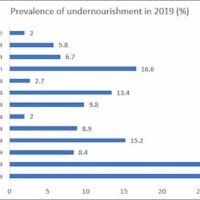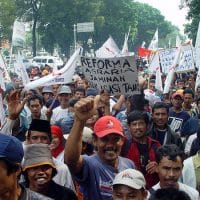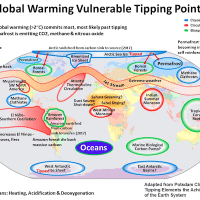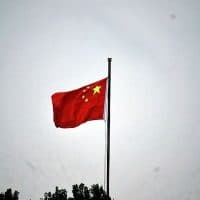-
“Poor rich Haiti” or how imperialists and local oligarchy have sought destroy agriculture in Haiti
From Haiti, Lautaro Rivara unpacks the tired trope of “poor rich Haiti,” highlighting the role of foreign capital and local elites in the destruction of life in the countryside.
-
Food Justice files PLANET FARM
As industrial agriculture encroaches into the last wild places of the Earth, it’s unleashing dangerous pathogens. Time to heal the metabolic rift between ecology and economy, suggests Rob Wallace.
-
Newfoundland = New found fish
While treasure fleets carried silver to Spain, far more ships were carrying men, fish and whale oil across the North Atlantic.
-
We have to change our suicidal ways and reconcile with nature to tackle climate crises and pandemics
Every day, entrepreneurs in Brazil cut down more of the Amazon to produce cheap soybeans for animals in Europe and America. Vietnam, Indonesia and Malaysia tear up their forests to produce cheap coffee and palm oil for the world.
-
Hunger, again
The world has been preoccupied with the COVID-19 pandemic, and this has also affected policymakers everywhere. There is much more recognition today of the terrible effects of underfunding public health over decades and how this affects the resilience of economies and societies.
-
The Indian farmers are right: their land is at stake (Part 3)
The story of Mexico’s agriculture can be organised around two threads: corn and land.
-
The Indian farmers are right: their land is at stake (Part 2)
In the previous part of this article we saw that the Indian rulers are actively preparing the legal groundwork for parting peasants from their land. In the following part we place this in an international context.
-
Commodity cod & factory ships
Beginning a series on the role of fishing in the birth and spread of capitalism, and the role of capitalism in today’s mass extinction of ocean life.
-
Farmers in protest: Learning from the past and creating history with a real definition of nationalism
“The nationalists to be effective must harness the nation into action, into revolt.… The nation will stir itself to action only on assurance of nationalization. i.e.… Freedom from slavery of Imperialist—capitalists.” —Bhagat Singh
-
Why are people going hungry in India despite a massive grain surplus?
The peasants gathered on the Delhi border understand all these issues much more clearly than either Modi or the intelligentsia advocating a shift away from food grains. Ironically, it is the latter group who are suggesting that the peasants are ignoramuses!
-
The Global angle to the Farmer protests
The farmers’ movement for the repeal of the three farm laws which affect them closely but have been rammed through without consulting them, has now entered its second month.
-
These indigenous women are leading a land struggle against the wealthiest people in the U.S.
While the United States shudders in the shambles of another election year, whether from a collective sigh of relief or fear of what’s to come, a different system of governance blooms in a swath of woodlands jutting into the Atlantic Ocean.
-
Engels’ struggle for a dialectical concept of nature
To prevent climate catastrophe, revolutionary decisions are needed based on a widespread understanding of the “dialectics of nature”, which Friedrich Engels, on his joint mission with Karl Marx, sought to explain.
-
Joe Biden wants racist servant of big business in charge of U.S. agriculture
President-elect Joe Biden’s recent nomination of Tom Vilsack to serve as the next Secretary of the U.S. Department of Agriculture (USDA) is causing widespread outrage among food justice activists and Black farmers.
-
Secret Amazon reports expose the company’s surveillance of labor and environmental groups
Dozens of leaked documents from Amazon reveal the company’s use of Pinkerton operatives to spy on warehouse workers, labor unions and social movements.
-
The pillage of resources: A glimpse into the lives and labor of marginalized women
Lives of women dependent on natural resources, such as land, forests, rivers, and mountains, are being tossed asunder by the appropriation and expropriation of these resources by corporations and the state.
-
Are “net-zero” emissions a smoke screen?
Peter Carter of the Climate Emergency Institute says “net zero” carbon emissions by 2050 and targeting 2 degrees warming are a recipe for runaway climate catastrophe. On theAnalysis.news podcast with Paul Jay.
-
Eric Hobsbawm’s dialectical materialism in the postwar period 1946-56
Hobsbawm’s thinking was guided by dialectical materialism, which was a scientific outlook based on analysis. It always accounted for unpredictable human agency and, though economic factors played the principal role in the development of history, this study rejects the claim that Hobsbawm was a mechanical determinist.
-
China is working to expand its ties to Latin America
In mid-January 2020, 800 people gathered at Mexico’s Ministry of Economy to celebrate “China Day” with a seminar on Chinese-Mexican relations.
-
India’s move toward a de facto unitary state
India is being pushed toward a de facto unitary state, with states being kept totally out of the loop in decision-making, as seen in the new agricultural laws, goods and services tax compensation, Jammu and Kashmir bifurcation and new National Education Policy.


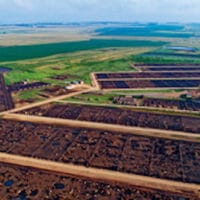
![“In the sixteenth and partly still in the seventeenth, the sudden expansion of trade and the creation of a new world market had an overwhelming influence on the defeat of the old mode of production and the rise of the capitalist mode.” — Karl Marx[1]](https://mronline.org/wp-content/uploads/2021/03/boat-200x200.png)

